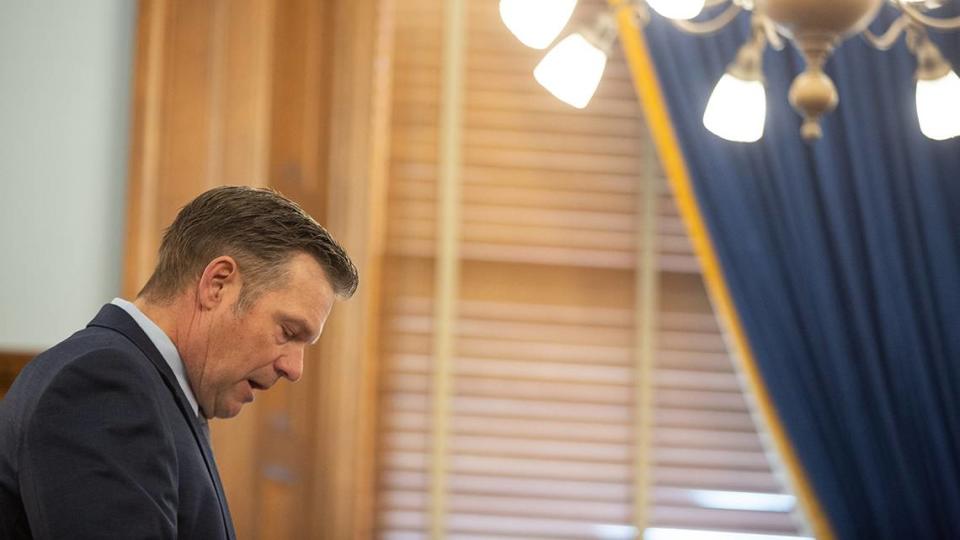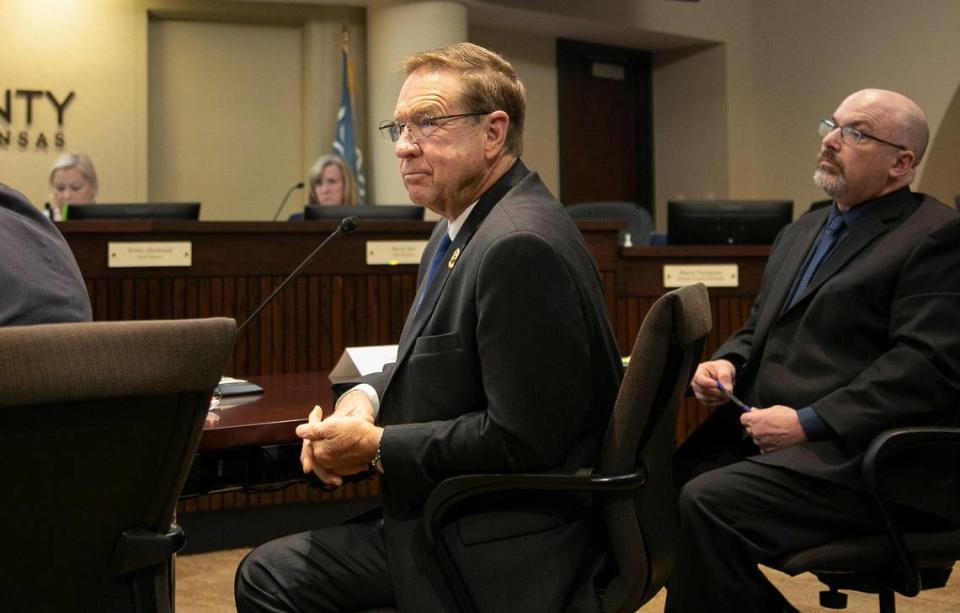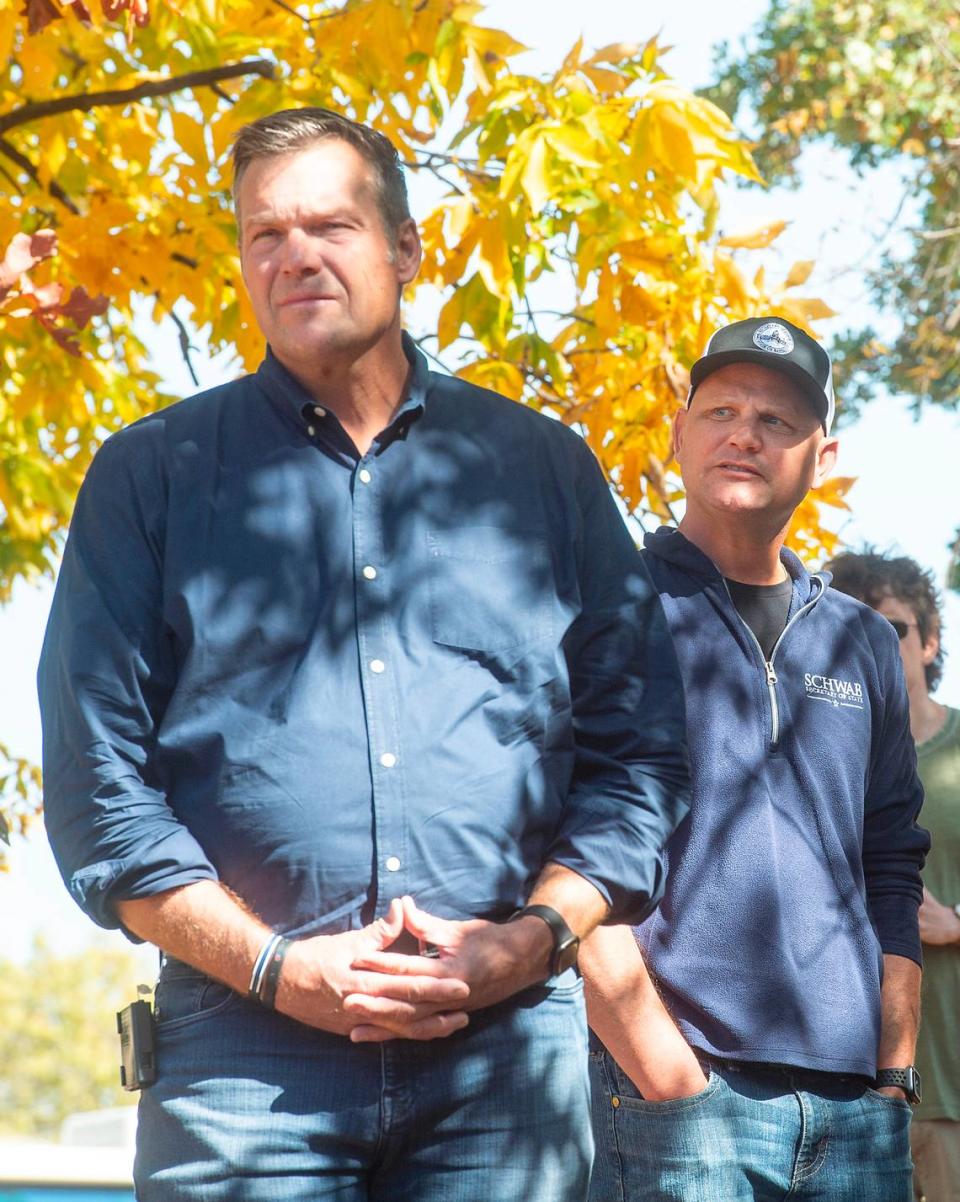Kris Kobach helped Donald Trump contest elections before. How far could he go in 2024?
- Oops!Something went wrong.Please try again later.
- Oops!Something went wrong.Please try again later.
When Texas filed a last-ditch lawsuit in December 2020 asking the U.S. Supreme Court to invalidate President Joe Biden’s victory over then-President Donald Trump in key battleground states, Kris Kobach helped develop the complaint that would have overturned the election if it had succeeded.
“That lawsuit was drafted by a group of five attorneys who assisted the state of Texas,” Kobach told a right-wing podcast in December. “I was one of those five attorneys, behind the scenes, drafting that lawsuit.”
Trump and Biden effectively secured their respective party nominations in last week’s primary elections. The rematch raises the prospect that Trump, who continues to falsely paint the 2020 election as stolen, will again, with his allies, advance baseless allegations of fraud if he loses in November.
Kobach was a private citizen in 2020. But four years later, the Republican is the Kansas attorney general, with the power to file lawsuits on behalf of the state, a more prominent public platform afforded by his office and the authority to prosecute election crimes.
What will Kobach do this time?
Interviews with longtime Kobach observers, election experts, lawmakers and others suggest widespread concern that Kobach and other state attorneys general would again aid legal challenges to the presidential election. Kobach’s critics also fear how he will use his prosecutorial authority to pursue election fraud cases at a moment when unfounded local election conspiracies have taken root in Johnson County, the state’s most populous county.
A review of Kobach’s public comments provides a portrait of an official who views the Texas lawsuit as an important part of his “voter integrity” legacy and who continues to believe the U.S. Supreme Court erred when it declined to take the case. Kobach, who served on Trump’s voting integrity commission, has said he believes fraud occurred in 2020 battleground states, even as he has also said Americans will never know “how many fraudulent ballots were cast.”
Kobach has also been vehement in saying that he will prosecute election crimes. Last month he announced a case against a Florida man over allegations that he forged signatures in No Labels’ bid for recognition as a political party in Kansas. At the same time, Kobach has distanced himself from some of the demands of election deniers.
Even before Trump launched his first campaign for president in 2015, Kobach had earned a reputation for promoting restrictive rules on voter registration to limit fraud. He successfully convinced the Legislature to approve a requirement that voter registration applicants prove their citizenship — a rule later struck down in federal court.
“Former President Trump uses this as a fallback so that in the event the voters turn him out again he can again attempt to challenge the legitimacy of the election,” Rep. John Carmichael, a Wichita Democrat long critical of Kobach, said of claims of election fraud.
“There is absolutely no doubt that Kris Kobach will be his comrade in arms in such an attempt.”
Kobach’s office didn’t respond to questions for this story.
In December 2020, Texas Attorney General Ken Paxton filed a lawsuit that recycled baseless claims of illegal voting in four swing states won by Biden — Georgia, Pennsylvania, Wisconsin and Michigan. The state attorneys general in Kansas and Missouri at the time, Republicans Derek Schmidt and Eric Schmitt, signed on to amicus briefs in support of the effort.
The lawsuit itself alleged the swing states violated the U.S. Constitution in how they modified their election procedures because of the pandemic. In an unsigned ruling, the Supreme Court said Texas lacked standing to bring the challenge. The decision marked the end of Trump’s court-based effort to hold on to power.
The Texas lawsuit represents a “real black mark” on the records of some state attorneys general, said David Becker, the executive director of the Center for Election Innovation and Research, which seeks to build trust in elections. The lawsuit would have “sought to disenfranchise all of the voters in states that none of these AGs represented.”
“I mean, think about how radical that is. Think about how offended those voters should be,” Becker said.

Kobach’s exact contributions to the Texas lawsuit remain unclear. Emails previously obtained by American Oversight show Kobach in late November 2020 attempting to connect with Louisiana Attorney General Jeff Landry, who later supported the Texas effort.
Kobach was also among a group of eight attorneys in December 2020 who received an email from pro-Trump lawyer John Eastman that discussed potential intervention by Vice President Mike Pence during the electoral college certification, according to the U.S. House’s report on the Jan. 6, 2021, attack on the Capitol. Kobach responded that the phrasing of the U.S. Constitution didn’t give Pence latitude to determine which electoral votes to count.
In December 2023, Kobach appeared on the podcast of Doug Billings, a right-wing media personality, where he said he was one of five attorneys involved in drafting the Texas lawsuit. He called the Supreme Court’s decision not to take the case “erroneous” but “water under the bridge now.” That follows a 2022 interview with The Associated Press where Kobach said “there’s no question” fraud occurred in 2020 in Michigan and Pennsylvania.
Kobach wasn’t asked on the Billings podcast whether he would be willing to participate in similar litigation in the 2024 election. But Trump, who Kobach has informally advised in the past, has been laying the groundwork for significant legal efforts.
After Trump’s campaign effectively took over the Republican National Committee earlier this month, the party is bringing on Christina Bobb, a lawyer and former One America News correspondent who has promoted Trump’s stolen election claims.
Mark Johnson, a Kansas City-based attorney who has long worked on election-related issues, said the “big problem” faced by states that filed lawsuits over the 2020 election was a lack of standing to bring their suits.
“I think they’re going to be smarter about it and they’ll find plaintiffs that have standing,” Johnson said.
Prosecuting election crimes
Whether Kobach gets involved in the presidential race, he enjoys prosecutorial authority over election crimes in Kansas — thanks to a 2015 state law he championed that gave both the state secretary of state and state attorney general the power to prosecute.
Some hard-right conservatives and election conspiracy theorists have pushed Kobach to bring cases in Johnson County, where Republican Sheriff Calvin Hayden has long been leading an elections investigation.
Hayden has been probing the county’s past use of Konnech, which produces software the county had used to manage election workers. Konnech’s CEO was arrested in Los Angeles County in 2022 on accusations that he illegally stored poll worker data in China. The case was dropped a few weeks later, with the district attorney citing “potential bias” in the investigation.
Earlier this year, Los Angeles County agreed to pay $5 million to the CEO, who sued over civil rights violations.
Kobach in a December letter asked Johnson County Election Commissioner Fred Sherman to preserve old ballots because of the investigation, despite a state law mandating their destruction. Johnson County had held off on the state-mandated destruction of ballots since 2019 at the request of Hayden, but resumed its normal practice and destroyed the ballots in February.

After a year in office, Kobach has brought one known election case, against George Andrews of Dade City, Florida. He also brought a handful of cases involving double voting as Kansas secretary of state.
Andrews is charged with two counts of election perjury and 28 counts of election forgery for allegedly forging signatures on petitions to make “No Labels” an officially recognized political party in Kansas. He also faces allegations of submitting invalid petitions in Florida. Andrews is currently in jail in Florida.
“If there is an election crime, your viewers can rest assured, we will go after it,” Kobach said on the Billings podcast.
Speaking to The Star earlier this month, Kobach said his office expected that there were additional instances of fraudulent signature gathering and that his office hoped to make more information public soon.
Kobach, who appeared on the Billings show after a previous guest criticized him for inaction related to Konnech, said it was important to distinguish between “bad election management and committing an election crime.”
“Bad policy is not a crime unless it is specifically defined in Kansas law as one of the election crimes,” Kobach said.
Kobach may soon wade back into Johnson County’s decision to go ahead with the ballot destruction. In January, Sen. Mike Thompson, a Shawnee Republican, requested an attorney general’s opinion on the authority of election officials to destroy ballots when they are subject to a criminal investigation.
On March 6, Kansas Solicitor General Anthony Powell, who reports to Kobach, asked the office of Kansas Secretary of State Scott Schwab for any input it wanted to provide related to Thompson’s question, according to documents obtained by The Star.
Several individuals familiar with Kobach, when asked whether they had concerns about how he would handle the 2024 election, responded that they trusted Schwab. In office since 2019, the Republican has developed a reputation for efficiently overseeing elections and aggressively knocking down conspiracies and unfounded fears related to Kansas election security.
“I think the issue is really more what our secretary of state will do. You know he’s the one in charge of our elections and I have been impressed with Secretary Schwab since day one,” Democratic Gov. Laura Kelly told reporters on Wednesday.
Election law challenges
Both Schwab and Kobach are trying to uphold Kansas laws opposed by Democrats and civic groups. Those measures include making it a crime to impersonate an elections official, which critics say is too broad, and limits on how many ballots a single person can return on behalf of others.
Legal challenges to those laws are before the Kansas Supreme Court, which could rule at any time. The Kansas Court of Appeals previously found that voting is a “fundamental right,” a decision that could upend election law in the state if affirmed by the Supreme Court.
But Schwab and Kobach are split on ballot drop boxes, with Kobach opposing them. In the Kansas House, Republicans want to give Schwab the power to regulate the drop boxes, but some Republicans want to ban them outright. While Democrats largely support drop boxes, their use divides Republicans, with some advancing unsubstantiated concerns about their security.

Earlier this month, Senate Republicans attempted to pass a bill that would have banned all drop boxes not monitored within an election office. The bill failed after Sen. Mark Steffen, a Hutchinson Republican, successfully amended it to also ban electronic voting machines and require hand counting of ballots.
Rep. Pat Proctor, a Leavenworth Republican who chairs the House Elections Committee, said giving Schwab the authority to regulate drop boxes would have been a “common sense” measure to help restore voter confidence, which he called his top concern.
“It’s gonna get a bruising here during the election,” Proctor said.
As for Kobach?
“The people of Kansas trusted his conduct enough to elect him the attorney general of Kansas,” Proctor said. “I have supreme confidence in the wisdom of Kansas voters.”

